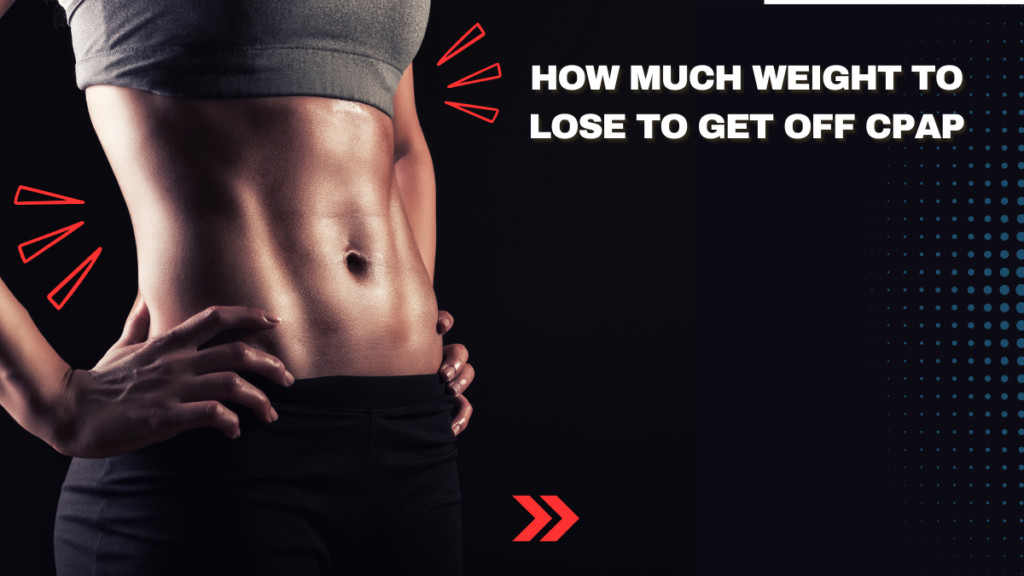Table of Contents
Introduction: How Much Weight to Lose to Get Off CPAP
Continuous Positive Airway Pressure (CPAP) therapy is a common treatment for obstructive sleep apnea (OSA), a condition where breathing repeatedly stops and starts during sleep. Many individuals wonder whether losing weight can help them get off CPAP and, if so, how much weight they need to lose.
In this guide, we’ll explore the relationship between weight loss and sleep apnea, How Much Weight to Lose to Get Off CPAP?, and effective strategies to achieve this goal.
Understanding the Link Between Weight and Sleep Apnea
Obesity is one of the leading risk factors for obstructive sleep apnea. Excess weight, particularly around the neck, can put pressure on the airway, causing it to collapse during sleep. This leads to interruptions in breathing, which CPAP therapy helps prevent by maintaining airway pressure. How Much Weight to Lose to Get Off CPAP. A healthy diet refers to a balanced and nutritious way of eating that provides the body with essential vitamins, minerals, and nutrients needed to function correctly.
While weight loss is not a guaranteed cure for sleep apnea, it can significantly reduce its severity and, in some cases, eliminate the need for CPAP therapy.
How Much Weight Do You Need to Lose to Stop Using CPAP?
There is no universal number when it comes to weight loss and getting off CPAP. However, studies suggest that even moderate weight loss can improve sleep apnea symptoms. How Much Weight to Lose to Get Off CPAP
Research-Based Estimates:
- 10% Weight Loss: Studies show that losing just 10% of body weight can lead to a 30% reduction in sleep apnea severity.
- 15-20% Weight Loss: More significant weight loss (around 15-20% of body weight) has been associated with complete remission of mild to moderate sleep apnea in some individuals.
- BMI Under 25: If your sleep apnea is weight-related, doctors often recommend reaching a healthy BMI (Body Mass Index) below 25 as a goal for possibly discontinuing CPAP.
🔹 Example: If you weigh 250 pounds, losing 25 to 50 pounds (10-20%) may significantly improve or even eliminate your sleep apnea. How Much Weight to Lose to Get Off CPAP
Other Factors That Influence Sleep Apnea Improvement
While weight loss plays a significant role, other factors determine whether you can stop using CPAP: How Much Weight to Lose to Get Off CPAP
✅ Neck Circumference: A neck circumference of 17 inches or more (for men) and 16 inches or more (for women) increases sleep apnea risk. Even reducing it slightly can help.
✅ Fat Distribution: Fat stored around the neck and upper airway impacts breathing more than fat stored elsewhere.
✅ Severity of Sleep Apnea: Those with severe OSA may need additional treatments even after weight loss.
✅ Genetics & Anatomy: Some people have naturally narrower airways, making them more prone to sleep apnea. How Much Weight to Lose to Get Off CPAP
Signs You May Be Able to Stop Using CPAP
Even after weight loss, you should not stop using CPAP without medical guidance. However, some signs may indicate that your sleep apnea is improving:
✅ Less snoring or no snoring at all
✅ Waking up feeling more refreshed
✅ Improved daytime energy levels
✅ No gasping or choking during sleep (reported by a partner) How Much Weight to Lose to Get Off CPAP
How to Safely Transition Off CPAP After Weight Loss
If you believe your sleep apnea has improved due to weight loss, follow these steps:
- Consult Your Doctor: A sleep specialist can assess whether discontinuing CPAP is safe for you.
- Undergo a Sleep Study: A follow-up sleep study (polysomnography) will determine if your apnea index has decreased.
- Monitor Symptoms: Keep track of any recurring symptoms like snoring, fatigue, or daytime drowsiness. How Much Weight to Lose to Get Off CPAP
Effective Weight Loss Strategies to Reduce Sleep Apnea

Losing weight in a healthy and sustainable way is crucial. Here are some strategies that can help: How Much Weight to Lose to Get Off CPAP
1. Focus on a Healthy Diet
🍏 Reduce Processed Carbs & Sugar: Cut back on refined carbs and sugary drinks.
🥩 Increase Protein Intake: Lean proteins like chicken, fish, and beans help keep you full.
🥦 Eat More Fiber: Vegetables, fruits, and whole grains improve digestion and satiety.
🍽 Practice Portion Control: Eating smaller portions can prevent overeating.
2. Exercise Regularly
🏃♂️ Cardio Workouts: Activities like walking, jogging, cycling, and swimming improve overall health.
💪 Strength Training: Building muscle increases metabolism and aids weight loss.
🧘 Yoga & Breathing Exercises: These help improve lung capacity and breathing patterns. How Much Weight to Lose to Get Off CPAP
3. Improve Sleep Hygiene
😴 Get 7-9 Hours of Quality Sleep: Poor sleep can lead to weight gain and worsen apnea.
🌙 Avoid Alcohol & Sedatives: These can relax throat muscles and worsen symptoms.
🛏 Sleep Positioning: Sleeping on your side rather than your back can reduce airway obstruction.
4. Consider Medical or Surgical Options
- Weight Loss Medications: In some cases, doctors may prescribe weight loss medications.
- Bariatric Surgery: For individuals with severe obesity, weight loss surgery can be a life-changing solution.
Real-Life Success Stories: People Who Got Off CPAP with Weight Loss
Many individuals have successfully reduced or eliminated their sleep apnea symptoms through weight loss. Here are a few real-life experiences:
📌 Mark, 45, lost 60 pounds: Mark was diagnosed with moderate sleep apnea and used CPAP for three years. After losing 60 pounds through diet and exercise, his follow-up sleep study showed his apnea was gone. His doctor advised discontinuing CPAP under supervision. How Much Weight to Lose to Get Off CPAP
📌 Susan, 52, lost 35 pounds: Susan had mild OSA and was overweight. After adopting a healthy lifestyle and losing 35 pounds, her symptoms improved significantly, and her doctor allowed her to stop CPAP.
📌 James, 38, post-bariatric surgery: James had severe OSA and underwent bariatric surgery. After shedding 100+ pounds, he no longer needed CPAP, as confirmed by his sleep study.
Common Myths About Weight Loss and CPAP
🚫 Myth 1: Losing weight automatically cures sleep apnea.
✅ Fact: While weight loss helps, some people still need CPAP due to anatomical or genetic factors.
🚫 Myth 2: CPAP users should stop therapy as soon as they lose weight.
✅ Fact: A sleep study is necessary before stopping CPAP, even after weight loss.
🚫 Myth 3: Sleep apnea only affects overweight people. How Much Weight to Lose to Get Off CPAP
✅ Fact: Thin individuals can also have sleep apnea due to airway structure, genetics, or other factors.
Final Thoughts: Can You Get Off CPAP by Losing Weight?
Yes, losing weight can significantly improve or even eliminate obstructive sleep apnea in some individuals. However, the amount of weight you need to lose varies based on your body, sleep apnea severity, and overall health. Always consult a sleep specialist before making changes to your CPAP therapy.
Take Action Today!
✔ Start with small, sustainable lifestyle changes.
✔ Set a realistic weight loss goal.
✔ Consult your doctor before stopping CPAP.
Have you tried losing weight to improve sleep apnea? Share your experience in the comments! 💬👇




